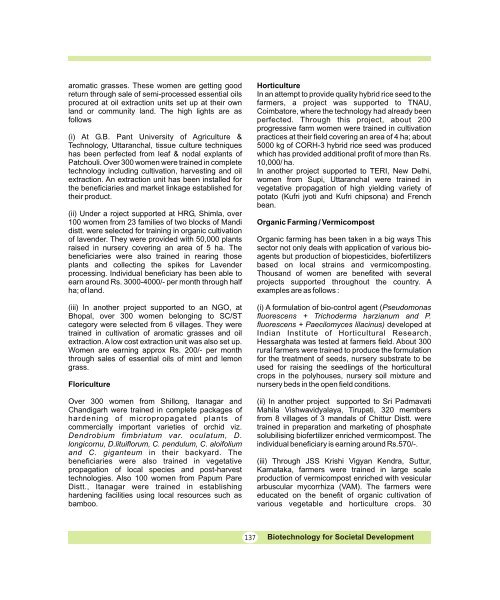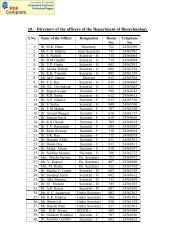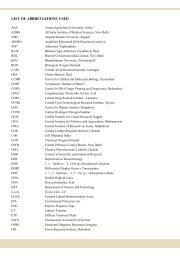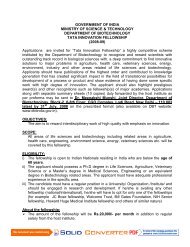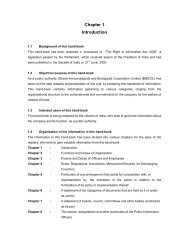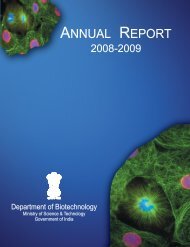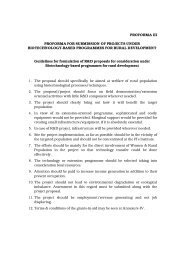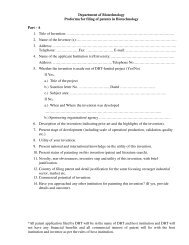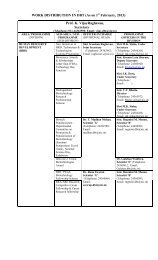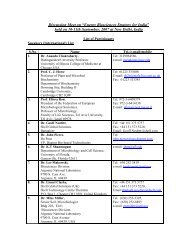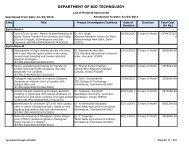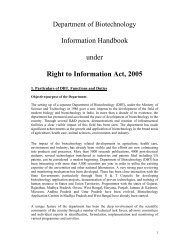ANNUAL REPORT - Department of Biotechnology
ANNUAL REPORT - Department of Biotechnology
ANNUAL REPORT - Department of Biotechnology
Create successful ePaper yourself
Turn your PDF publications into a flip-book with our unique Google optimized e-Paper software.
aromatic grasses. These women are getting good<br />
return through sale <strong>of</strong> semi-processed essential oils<br />
procured at oil extraction units set up at their own<br />
land or community land. The high lights are as<br />
follows<br />
(i) At G.B. Pant University <strong>of</strong> Agriculture &<br />
Technology, Uttaranchal, tissue culture techniques<br />
has been perfected from leaf & nodal explants <strong>of</strong><br />
Patchouli. Over 300 women were trained in complete<br />
technology including cultivation, harvesting and oil<br />
extraction. An extraction unit has been installed for<br />
the beneficiaries and market linkage established for<br />
their product.<br />
(ii) Under a roject supported at HRG, Shimla, over<br />
100 women from 23 families <strong>of</strong> two blocks <strong>of</strong> Mandi<br />
distt. were selected for training in organic cultivation<br />
<strong>of</strong> lavender. They were provided with 50,000 plants<br />
raised in nursery covering an area <strong>of</strong> 5 ha. The<br />
beneficiaries were also trained in rearing those<br />
plants and collecting the spikes for Lavender<br />
processing. Individual beneficiary has been able to<br />
earn around Rs. 3000-4000/- per month through half<br />
ha; <strong>of</strong> land.<br />
(iii) In another project supported to an NGO, at<br />
Bhopal, over 300 women belonging to SC/ST<br />
category were selected from 6 villages. They were<br />
trained in cultivation <strong>of</strong> aromatic grasses and oil<br />
extraction. A low cost extraction unit was also set up.<br />
Women are earning approx Rs. 200/- per month<br />
through sales <strong>of</strong> essential oils <strong>of</strong> mint and lemon<br />
grass.<br />
Floriculture<br />
Over 300 women from Shillong, Itanagar and<br />
Chandigarh were trained in complete packages <strong>of</strong><br />
hardening <strong>of</strong> micropropagated plants <strong>of</strong><br />
commercially important varieties <strong>of</strong> orchid viz.<br />
Dendrobium fimbriatum var. oculatum, D.<br />
longicornu, D.lituiflorum, C. pendulum, C. aloifolium<br />
and C. giganteum in their backyard. The<br />
beneficiaries were also trained in vegetative<br />
propagation <strong>of</strong> local species and post-harvest<br />
technologies. Also 100 women from Papum Pare<br />
Distt., Itanagar were trained in establishing<br />
hardening facilities using local resources such as<br />
bamboo.<br />
Horticulture<br />
In an attempt to provide quality hybrid rice seed to the<br />
farmers, a project was supported to TNAU,<br />
Coimbatore, where the technology had already been<br />
perfected. Through this project, about 200<br />
progressive farm women were trained in cultivation<br />
practices at their field covering an area <strong>of</strong> 4 ha; about<br />
5000 kg <strong>of</strong> CORH-3 hybrid rice seed was produced<br />
which has provided additional pr<strong>of</strong>it <strong>of</strong> more than Rs.<br />
10,000/ ha.<br />
In another project supported to TERI, New Delhi,<br />
women from Supi, Uttaranchal were trained in<br />
vegetative propagation <strong>of</strong> high yielding variety <strong>of</strong><br />
potato (Kufri jyoti and Kufri chipsona) and French<br />
bean.<br />
Organic Farming / Vermicompost<br />
Organic farming has been taken in a big ways This<br />
sector not only deals with application <strong>of</strong> various bioagents<br />
but production <strong>of</strong> biopesticides, bi<strong>of</strong>ertilizers<br />
based on local strains and vermicomposting.<br />
Thousand <strong>of</strong> women are benefited with several<br />
projects supported throughout the country. A<br />
examples are as follows :<br />
(i) A formulation <strong>of</strong> bio-control agent (Pseudomonas<br />
fluorescens + Trichoderma harzianum and P.<br />
fluorescens + Paecilomyces lilacinus) developed at<br />
Indian Institute <strong>of</strong> Horticultural Research,<br />
Hessarghata was tested at farmers field. About 300<br />
rural farmers were trained to produce the formulation<br />
for the treatment <strong>of</strong> seeds, nursery substrate to be<br />
used for raising the seedlings <strong>of</strong> the horticultural<br />
crops in the polyhouses, nursery soil mixture and<br />
nursery beds in the open field conditions.<br />
(ii) In another project supported to Sri Padmavati<br />
Mahila Vishwavidyalaya, Tirupati, 320 members<br />
from 8 villages <strong>of</strong> 3 mandals <strong>of</strong> Chittur Distt. were<br />
trained in preparation and marketing <strong>of</strong> phosphate<br />
solubilising bi<strong>of</strong>ertilizer enriched vermicompost. The<br />
individual beneficiary is earning around Rs.570/-.<br />
(iii) Through JSS Krishi Vigyan Kendra, Suttur,<br />
Karnataka, farmers were trained in large scale<br />
production <strong>of</strong> vermicompost enriched with vesicular<br />
arbuscular mycorrhiza (VAM). The farmers were<br />
educated on the benefit <strong>of</strong> organic cultivation <strong>of</strong><br />
various vegetable and horticulture crops. 30<br />
137 <strong>Biotechnology</strong> for Societal Development


